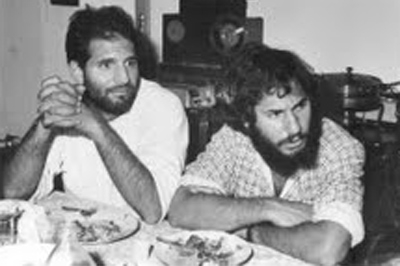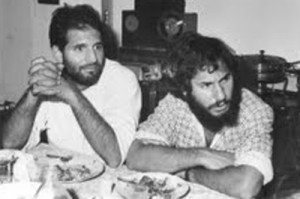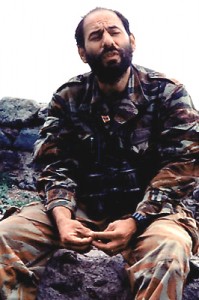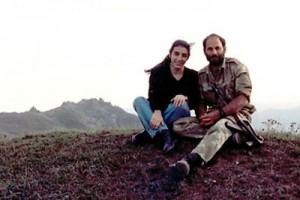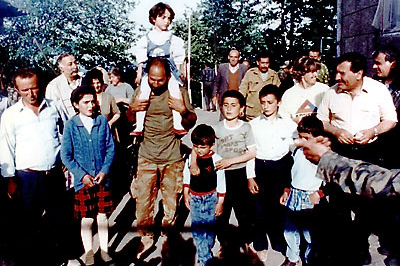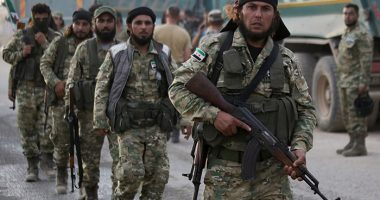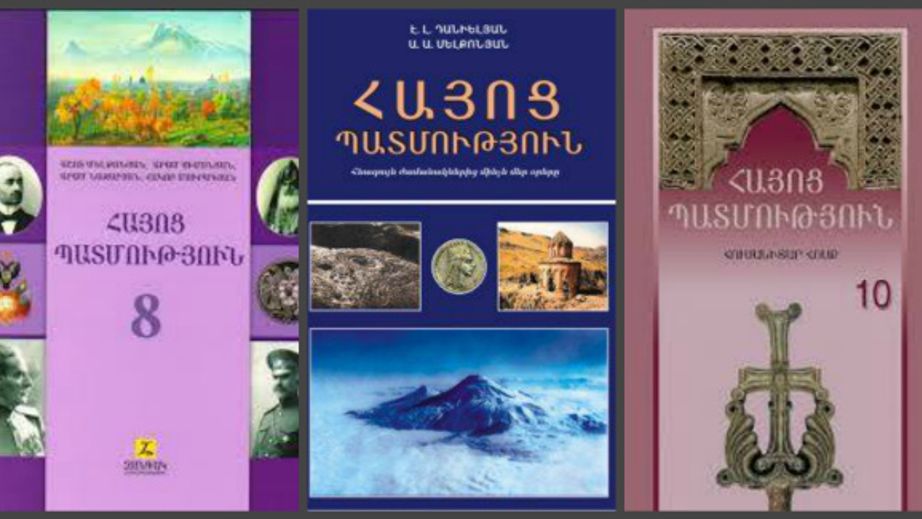On November 25, Monte “Avo” Melkonian would have turned 54. In the following piece, his brother Markar reflects on the man and the myths that continue to surround him.
By Markar Melkonian
Admirers and detractors alike have doodled out strangely incongruous versions of the National Hero – in this corner we have Avo the Armenian samurai, nonchalantly chopping off the heads of Turks between swigs of vodka.
And in the far corner we have Avo the soft-hearted prude, scooting snakes from roads and condemning alcohol and tobacco. Over here is the anti-Soviet freedom fighter, fresh from Afghanistan, where he helped deal the coup de grâce to the Evil Empire. But over there is the super-nationalist who did not care about anything but the Armenian Cause.
On one side we have the military professional, fixated on nothing but the daily tasks at hand. But on the other side we have the penitent ex-Communist, shedding the far-fetched egalitarian phraseology of yesteryear to embrace Free Enterprise, racial theories of history, and other exciting new post-Soviet ideas.
Occasionally, someone who introduces himself as a former pal of the National Hero glances around furtively and then in a low voice describes his good buddy Avo sneaking back into the United States—sometimes, inexplicably, with CIA assistance—to seek the speaker’s advice, or for dental work, or psychotherapy, or even to try his hand at the Armenian specialty of credit card fraud. (Yes, I’ve heard that story too.) Another correspondent describes Avo as just a regular guy, thrust into greatness by extraordinary circumstances.
None of these Avo’s bears much resemblance to the seventy-two kilogram Monte Melkonian that some of us knew. Consider the claim that Avo was just an ordinary guy whom history had thrust into greatness: those who knew Monte or who have read My Brother’s Road (1) can testify that this description does not apply. Or consider the question of Monte’s philosophy of life: one well-known author has his version of Avo, an especially “deep” and brooding character, drawing geopolitical conclusions from the observation that God Himself “had provided all earthly beings with natural weapons so that they could defend themselves—horns, hooves, fangs, claws and fists, and fast legs and, of course, courage” (2). I quote this zoological inaccuracy only because it exemplifies the sort of banality that some writers pinned onto the National Hero as soon as he had safely left the scene and could not protest against the misrepresentation. The value of truth has plummeted in the past twenty years, but for whatever it may still be worth, let it be noted that Monte would not have resorted to this sort of “confused, passive, evanescent emotionalism,” (3) even in passing. He just did not think in these terms. One may confirm this by comparing the “claws and fists” quote to Monte’s plodding, clinical prose in the selection of writings published as The Right to Struggle. It is less than unlikely that the author of those chalk-dry articles would have propounded the lyrical inanities attributed to this imaginary Avo.
As for Afghanistan, it is true that Monte had trekked across that country when he was barely in his twenties. Clinging to the luggage rack of a bus, he had jostled over hundreds of miles of rocky roads. He had huddled around the supper pot, and for the sake of propriety, he had joined roadside prayers. He was in the country for less than a week, but the visit left a deep impression. Not long afterwards he wrote in a letter that in Afghanistan he had learned much about “Muslim brotherhood.” A year and a half later, Russian tanks rolled into Afghanistan, and fifty days after that, Monte predicted that Soviet leaders would regret the decision to invade that unhappy land. He saw the Soviet invasion as a catastrophic miscalculation, but he never would have sided with Ronald Reagan, Osama bin Laden and their Freedom Fighters, much less joined their ranks.
Figments continue to mount, but My Brother’s Road will go some distance to dispel them. This was our hope, at any rate, when Monte’s widow and I set out to write the book.
Civilian Casualties
One or two super-nationalists have denounced us for failing to depict Armenians in their full angelic glory (4). They expect us to ignore or deny what informed people outside of Armenia have known for years, namely, that in addition to numerous atrocities by Azeri fighters against Armenians in Mountainous Karabakh, some Armenian fighters committed atrocities against non-Armenian civilians. Indeed, they expect us to ignore brutality on the Armenian side even when it has a direct bearing on the story to be told.
Azeri propagandists, on the other hand, describe Avo as an atrocity-monger. It is true that on more than one occasion Monte failed to control fighters who were supposed to be under his command, and this resulted in civilian deaths. This was a terrible failure and it should not be trivialized. But in response to this failure, he took steps–even in the welter of on-going battles, and at considerable risk to his own life–to shore up control of troops nominally under his command, and thereby to squelch abuses on the Armenian side. In the course of the war Monte saved the lives of many captured fighters and non-Armenian civilians. It would be preposterous to try to estimate the lives saved, but we know that he directed his artillery away from civilian areas, that he protected refugees and prisoners, notified non-Armenian civilians of impending offensives, and provided for their safe departure from areas of conflict. We also know that he freed captured noncombatants and exchanged prisoners of war, and that time and again he thwarted vengeful acts against captured enemy fighters and civilians.
All of this aside, from the fact that in the course of two years of relentless war, Monte and his fellow fighters defended the lives of the Armenian civilians who made up the large majority of the population of the region.
The war in Mountainous Karabakh was not a battle of angels against devils. In the course of his short life, Monte had not encountered much evidence of angels–but he had met saints. A soldier risked his life to save an Azeri girl; a family of villagers quietly sheltered former neighbors; an Armenian surgeon toiled tirelessly in candlelight to save an “enemy” child. Perhaps, in the midst of all the cruelty, there were saints on the Azeri side, too.
The End of Soviet Armenia
And then there is the matter of politics. Back in the early 1990s, thousands of adults in Yerevan had convinced themselves that they were standing at the threshold of the New Millennium, but Monte was not among them. He was a student of history who knew that one generation’s wisdom was another generation’s folly. “If we are realistic,” he wrote in the late 1980s, “it is easy to see that an ‘independent’ Armenia would not be able to meet the needs of its population if left to its own devices” (5) He expanded on this thought in the next paragraph:
An impoverished Armenian nation-state would lead to massive emigration. And, as in the case of other “lesser developed countries,’” the first to leave would be the best trained and educated segment of the population, thus leading to the downward spiral so familiar in other countries: poverty—emigration—further poverty—further emigration (6).
We have seen that this is exactly what has taken place in the past twenty years of supposed independence.
For years, Monte had hoped that the Soviet Union would reform itself, democratize, and promote personal freedoms. Not long after he arrived in Yerevan in October 1990, however, he concluded that the Soviet order was doomed. But he also knew that “the people” blunder, and that, as often as not, groups fight passionately against their own best interests. In Yerevan in 1991, Monte believed that a national blunder was taking place right before his eyes. But only when the end of the Soviet era appeared inevitable did he abandon hope in Soviet Armenia. And even after it had become certain that the Soviet order was doomed, he accepted it as “a very unfortunate development.”
Monte had not always been a communist, but he had never been an ex-communist. In the summer of 1991, long after it was clear to him that the USSR had already died in all but name, he had endorsed inclusion of his article, “Imperialism in the New World Order” as an epilogue to the second edition of The Right to Struggle. The article is an impassioned declaration of support for socialist struggles from Palestine to South Africa and Central America. This message appears elsewhere in The Right to Struggle, too.
If Monte never publicly lamented the demise of the USSR, this was not because his politics had changed, but rather because his single-minded devotion to the Armenian nation had not changed. The Soviet order had crumbled. There would be no turning back, and Monte did not have time for pointless public recrimination. He was too busy trying to pick up the pieces.
The Pure Patriot
The political thinker Karl Deutsch once defined a nation as a group of people united by a mistaken view about their past and a common hatred of their neighbors.Whether or not the crowds in Opera Square twenty years ago shared a mistaken view about their past, some of the demonstrators—not all, but some—reviled the very notion of friendship among the peoples of the USSR. In this and other respects they closely resembled their counterparts in Baku.
Monte, however, did not share the demagogues’ hatred of “Turks.” He had long since outgrown such feelings, and since then he had occasion to call some Turks friends. Rather than hatred, what sustained Monte was a fierce devotion to “Armenia.” To him, this was more than just a word. In part, Armenia was the land–the mountains, rivers, and forests that he loved to explore, Lake Sevan where he loved to swim, and the native animals that he encountered wide-eyed. Even in brief lulls between battles, he could not resist praising the wild beauty of it all. Of course Armenia included culture too–the food, music, songs and dances, village life and traditional dress, proverbs and fairy tales, all in their rich regional variety. It also included church architecture and the liturgy, poetry, theatre and modern literature. And then there was the language, which Monte had learned as an adult and spoke in the Western dialect that he especially loved.
People were also a part of Armenia, and Monte was quite explicit in his belief that Armenians of the diaspora were part of the Armenian nation (7). He never forgot the villagers in Iran, Lebanon, and Artsakh who opened their doors to him, nor the families in Tehran, Beirut, Paris, and Yerevan who shared their tables and their blankets. He swore allegiance to Garlen Ananian, Aram Vartanian, Aram Basmadjian, Pierre Gulimian, and other unsung martyrs in the diaspora; and when he did, he was swearing allegiance to Armenia. And then of course there were scores of comrades-in-arms in Artsakh—people like Saribeg Mardirosyan, Hrayr Garabedyan, Apo Hairapetyan, Garo Tovmasyan, Edik Baghdasaryan, and Humayag Haroyan. Monte could not have asked for better comrades than these and many other men and women; they were, as he said, “like gold.”
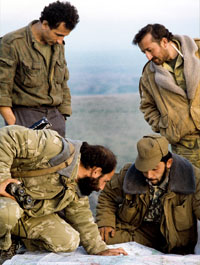

But Armenia is a country of extremes, with the best human material and also the worst. Monte’s unconditional devotion to his people sometimes took him to the edge of myopia. He made excuses for megalomaniacs and opportunists, and he disastrously underestimated how brutal some of his associates could be. According to him, a certain gangster was, at bottom, “patriotic,” and this or that homicidal thug was “a good guy.” On other occasions, Monte seemed to assume that when it came to the important decisions of life, his compatriots naturally gave first consideration to national culture and patriotic responsibilities. When he saw hundreds of would-be emigrants queued up outside the American consulate in Yerevan, he did not just see people seeking jobs or a better future for their children; more than that, he saw people consciously sacrificing their national life to protest with their feet against bad leadership in the Motherland. He believed that emigrants were leaving Armenia looking backwards.
Reviewing the careers of some people who wish to claim the title of National Hero, it seems that the welfare of the nation has not been as important to them as their egos, their vengefulness, their lust for power, or their greed. But this was not the case with Monte. With him, the welfare of Armenia took priority over everything else, including personal reputation, comfort, health, wealth, and life itself. One cannot properly understand Monte without understanding his strange, fierce, pure “attachment to Armenia,” as he called it. In this respect at least, the popular picture of Avo as the pure and uncompromised patriot is indeed a picture of the real Monte. Here, the myth meets the man.
Monte was fortunate to have lived as long as he did. There were occasions when he might more likely have caught a sniper’s bullet, or died in an air raid, a car bombing, or a dragnet. Some of his dearest comrades did not survive these things. More than anything, he considered himself lucky to have lived long enough to join the fight for self-determination in Artsakh.
But Monte is doubly fortunate not to have lived much longer than he did. He was lucky to have died before he could see what twenty years of “independence” and capitalism had done to his beloved homeland. Poverty, corruption, powerlessness, environmental degradation, injustice, debasement of values, and diplomatic servility to Ankara–it would have been very painful for him to have witnessed all of this. But worst of all would have been witnessing Armenia’s diminishment through emigration.
As for the rest of us, we too are fortunate in a way. Amid the proliferating mediocrity, lies, and astonishing greed of resurgent capitalism, Monte was neither a victim nor a gangster, and between his life and what he stood for, there was no air. In these days of dark folly, we are lucky to have a figure like Monte to help us love our nation.
Top Photo: Markar and Monte
NOTE: Markar Melkonian is a nonfiction writer with a Ph.D. in philosophy. His books include Richard Rorty’s Politics: Liberalism at the End of the American Century (Humanities Press, 1999), Marxism: A Post-Cold War Primer (Westview Press, 1996), and My Brother’s Road (I.B. Tauris, 2005, 2007), a memoir/biography about Monte Melkonian, co-written with Seta Melkonian.
1. I.B. Tauris, 2005. The Armenian version of this memoir/biography is entitled Avo: Monte Melkoniani Gyanku yev Mahu (Yerevan, 2007).
2. It would serve no good purpose to provide a full citation here. Suffice it to note that the author of this passage was a well-known writer in the days of the Karabakh Movement.
3. As he put it in “Reflections on Counterproductive Thinking,” an article included in The Right to Struggle (Sardarabad Press, 1990/1993), p. 206.
4. But other compatriots, more honest ones, have thanked us for acknowledging the fact that Armenians too committed atrocities during the war.
5.This passage and the one that follows appear in “National Self-Determination or National Suicide?” an article first written in a French prison in 1988, which then appeared in revised form in the first edition of The Right to Struggle (Sardarabad Press, 1990). The passage quoted appears on p. 167. Monte requested that the article be omitted from the definitive second edition of The Right to Struggle.
6. Ibid., p. 167.
7. The Right to Struggle, second edition, p. 28.

